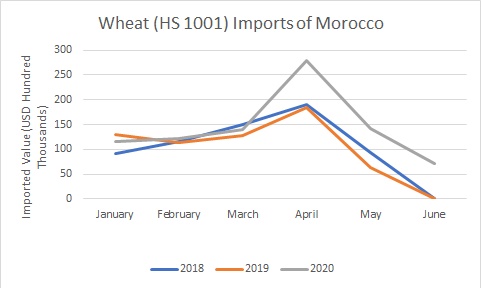Countries Build Wheat Reserves, Global Imports a Record High
Wheat imports have spiked in early 2020 as countries raced to stock up their reserves in fear of pandemic-induced food shortages, inflation, and growing livestock population. Some countries in the Middle East and North Africa - MENA, have stepped up their purchases of wheat more than ever before, with Pakistan, an export-oriented country for wheat, having increased its imports from none the previous year to USD 92 million in September, according to the Tribune.
Surges of Imports in MENA, Turkey
Pakistan has faced an ongoing wheat crisis since 2019, where despite calls of expected shortfalls, export bans were slow to be imposed, causing the situation to worsen. This year has seen a continuation of the issue, as the shortages were more severe than predicted, and imports have been difficult with rising international prices of wheat.
The start of 2020 kicked off with severe inflation rates, reaching 12.9% in August, the highest out of all the countries in the world. In an effort to control the inflation, Pakistan imported wheat for the first time since 2014 from Russia and is expected to import 1.5 million tons of wheat through Trading Corp. of Pakistan as well as an additional 1 million tons through private sectors, according to reports from Bloomberg.

Jordan has also made strides in building reserves, where it has stocked 1.35 million tons of wheat, approximately enough to last the country 18 months. As an import-centered country for grains and cereals, any disruptions would be catastrophic. In North Africa, Morocco has prolonged its customs duties for wheat imports until December 2020, which was originally planned to be suspended in June. The extension of the duty-free policy is unusual, as normally, Morocco would increase its tariffs to protect local producers during the summer.
The sudden change in policy was driven by the fact that Morocco has had its worst harvests in a decade, short by half of the ten-year average. Thus, Morocco also had a need to stocked up on its reserves. Where normally imports of wheat come from the Black Sea and Europe for Morocco, the US had the opportunity to export its common and durum wheat to the country, as the market became accessible in the summer.

Source: ITC Trade Map.
Turkey, like Pakistan, has been suffering from the impact of massive inflation on staple foods, and customs duties on cereal and grains have been brought to a zero until the end of 2020, where duties for wheat had previously been held at 45 percent.
Wheat Outlook
For the upcoming season, countries that have stocked up on wheat sufficiently during 2019/20 MY will have little need for imports in 2020/21. Turkey is expected to decrease its imported cereals for the 2020/21 season by 15%, and start with the highest opening stock in the last decade. Pakistan, as well, is expected to have a good wheat harvest in 2020/21, with higher than average water supplies. Total availability of wheat in 2020/21 is forecasted to at 1042.2 million tons, up slightly from the estimated 1024.6 million tons in 2019/20. Even though imports for the next season may not be as emphasized as this year, trade relations between Russia with Pakistan, or the US with Morocco, will have lasting implications.
The US for one has been seeking to utilize more of its FTA agreement with Morocco but has found it difficult to do so under the presence of the EU and the restrictive Tariff Rate Quotas (TRQ). The opening of the Moroccan market during the summer allows the US to present attractive prices and could give the US an advantage in expanding its market presence.
Sources
- ITC World Trade Map.
- Bloomberg. "Countries Rush to Hoard Food as Prices Rise and Covid Worsens."
- Bloomberg. "Pakistan to Buy 200,000 Tons Russian Wheat to Tame Inflation."
- Bloomberg. "Jordan Builds Record Wheat Hoard as Nations Boost Food Security."
- The Economic Times. "Pakistan sees highest inflation in the world during 2020 : SBP."
- The Tribune. "Pakistan becomes importer of major agri goods."
- USDA. Morocco Extends Suspension of Common Wheat import Duty until December 2020.
- US Wheat Associates. Comments Regarding Foreign Trade Barriers to US Exports for 2020.





